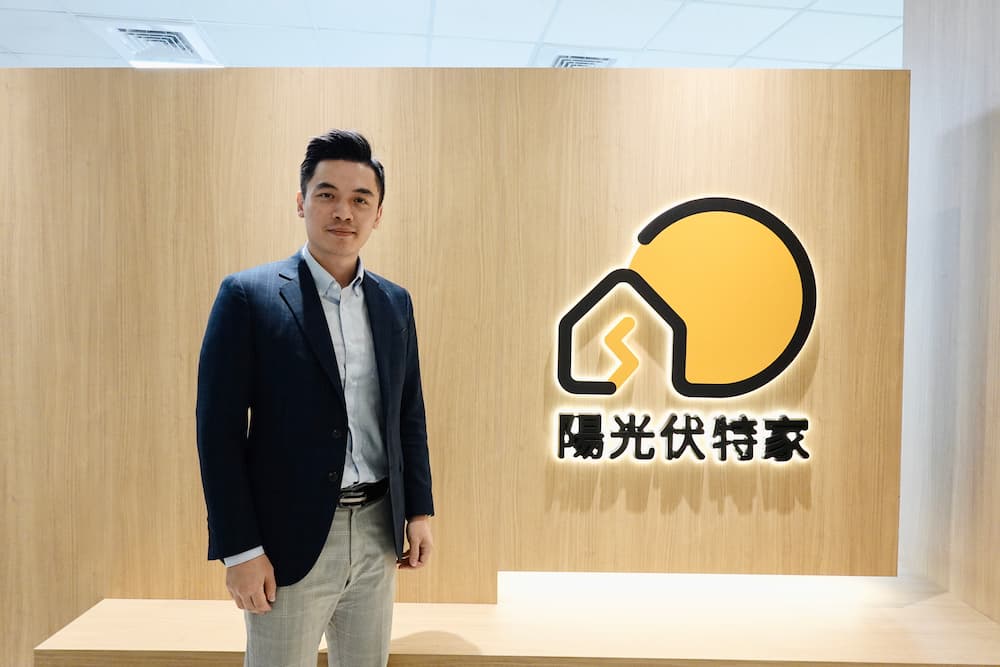Founded nearly nine years ago, Sunnyfounder started as a startup promoting community renewable energy projects and has now become one of the top five green electricity traders in Taiwan after securing the country's first renewable energy sales license. The company, which operates without a large power plant, addresses the pain points of power supply management complexity faced by small and medium-sized enterprises (SMEs) with accurate green electricity data, expanding its business amid the competitive renewable energy market.

Sunnyfounder's CEO Feng Hsiao-ru said that the company leverages its advantage in managing complexity accumulated from the period of community renewable energy projects, enabling them to acquire accurate data on green electricity trading. (Photo: Hsu Tsu-lin)
In Sunnyfounder's new office in Nangang, meetings are taking place in spacious open spaces. The company's green electricity trading business is growing rapidly, with the integrated green electricity transmission capacity expected to reach 144 million kWh this year, nearly doubling from 50 million kWh last year, and establishing green electricity trading as the future revenue stream, according to Sunnyfounder's CEO Feng Hsiao-ru (馮嘯儒).
Sunnyfounder has a broad customer base across Taiwan, including companies such as Watsons, Taiwan Mobile, Gogoro, and KPMG, which have adopted green electricity with the aid of Sunnyfounder. Demand for green electricity will continue to grow across various industries in the next three years, making the aggregator's role increasingly crucial, said Feng.
To handle a large amount of green electricity dispatch and matching, Sunnyfounder plans to expand its team from the current 45 people to 80 people this year.

Feng expects the company to grow to 80 people this year. Pictured is Sunnyfounder's new office in Nangang. (Photo: Hsu Tsu-lin)
Turning experience from community renewable energy into precise data analysis capability
With the upcoming implementation of the EU's Carbon Border Adjustment Mechanism (CBAM), international carbon reduction pressure has risen in recent years, and demand for green electricity among Taiwanese enterprises has also surged. As of May this year, the number of registered renewable energy sellers in Taiwan has reached 65, making the market increasingly competitive.
Taiwan's green electricity market has long faced an issue of "uneven distribution rather than scarcity," according to Feng, as nearly 90% of tradable green electricity is monopolized by individual enterprises. Therefore, power sellers play an important role in making it accessible and affordable for SMEs.
Feng worked in the technology industry before establishing Sunnyfounder in 2016. He decided to seek opportunities to enter the solar energy industry due to his research on solar energy materials in his master's thesis and the Taiwanese government's active promotion of green energy policies.
Sunnyfounder was established at a time when there were no renewable energy sellers in Taiwan, so we set up a platform for community renewable energy trading, he said.
Sunnyfounder noticed that no operators were willing to handle complex green electricity management. The community renewable energy platform had a maximum capacity of 30 MW, with over a thousand rooftop solar installations and 10,000 to 20,000 owners. This allowed them to find a market entry point, laying the foundation for multi-party green electricity trading management.
By 2019, Sunnyfounder successfully obtained Taiwan's first renewable energy sales license and began brokering deals between multiple power plants and buyers, focusing on addressing the needs of both parties in a single transaction, as well as multiple transactions simultaneously.
Optimizing supply, demand matching to reduce surplus electricity
When it comes to the most challenging case of power transmission, Feng mentioned the cooperation with Taiwan Mobile. Due to the dispersion of base stations and different customer numbers across Taiwan, a single green electricity transmission order may involve over 800 customer numbers. Matching the activity and timing of power generation and consumption tests the dispatching ability of power sellers.
On the other hand, power sellers seek to reduce the cost of surplus electricity. Sunnyfounder serves over a hundred customers, spanning manufacturing, finance, retail, and telecommunications sectors. This allows them to precisely analyze electricity usage patterns and optimize the matching between power plants and electricity users.
Feng explained that, for example, a manufacturer and a retailer can be formed as a customer group. When the manufacturer does not use green electricity on weekends, the retailer can take over, so that the group to purchase over 90% of a power plant's green electricity and minimize surplus power.
Every power plant wants to sell at higher prices. If the price is high but the matching is not done properly, only 30% of generated electricity can be sold. The value of power sellers lies in their ability to use their rich transmission experience to meet the needs of both power plants and users, thereby reducing transaction costs, said Feng.
Many-to-many model minimizes green electricity trading barriers
By sourcing green power from multiple plants, Sunnyfounder spreads the risk of erratic generation from a single plant or region and ensures guaranteed supply of power to buyers. In April this year, Sunnyfounder successfully transmitted hydro power, adding flexibility to green electricity supply at night. In the future, the company may include more types of renewable energy power plants.
Feng believes that Sunnyfounder can meet the needs of Taiwan's SMEs by expanding demand and continuously optimizing its matching and dispatching capabilities, which explains why Sunnyfounder, unlike J&V and HDRE with experience in developing large power plants, can still rank among the top five green electricity traders in Taiwan.
Sunnyfounder will continue to focus on reducing barriers in green electricity trading rather than increasing equipment capital expenditures. Feng believes that customer diversity improves the efficiency of matching and dispatching green electricity.
"If you have more clients, your flexibility to fulfill your obligations increases, creating a positive cycle," he said.